Theologically Rooted Vision
Our core values are theologically rooted and underpin our school vision and all that we do.
Love
Love in our school describes how we are one school family, where each individual is encouraged to love and respect themselves, others, our world and God.
Love is thinking about others before yourself.

Love is the key value that Christianity is built upon. It lies at the heart of all the other values. Whilst love is important in almost every culture and religion, Christians recognise that God the Father is love and that love comes from God (1 John 4:7). The Bible tells us that God loved us first. We are able to love in the true sense of the world because God loves us and when we show His Love, God lives in us.
Scripture
We see love shown in the Christian narrative in many ways.
Christians believe that Jesus’ death and resurrection were all because God loved us and wanted us to be made right with Him again. This was the ultimate expression of love. Almost every Christian story has at the heart of it the love of God.
When the apostle Paul wrote to the church at Corinth, he instructed them to “Let all that you do be done in love” (1 Corinthians 13:4-8)

When Jesus speaks to the Pharisees (Matthew 22:38), he reminds them “‘Love the Lord your God with all your heart and with all your soul and with all your mind. ’This is the first and greatest commandment. And the second is like it: ‘Love your neighbour as yourself.’ All the Law and the Prophets hang on these two commandments.”
Jesus also tells his disciples (John 15:12) ‘My command is this: Love each other as I have loved you’.
How do we demonstrate the value of love?
For us at Preston Candover CE Primary, we promote an ethos of care and concern which embraces all members of the school community at Preston Candover and beyond.
We demonstrate love through the offer of entitlement, which we make to all children to support their educational, emotional, social, moral, cultural and spiritual development. Our commitment to this is demonstrated through our provision of a broad and balanced curriculum and the support of all the children’s emotional needs.
- We are inclusive and welcome everyone
- We provide a safe and nurturing environment
- We support all learners, academically and otherwise
- Our worship themes and liturgy demonstrate God’s love
- We show kindness, empathy and compassion to others
- We encourage children to identify ‘love’ through their actions
- We care about our neighbours and our world
- We show thankfulness to those who help us
- We recognise and celebrate individuality and diversity
- We model actions that create a loving community
- We encourage healthy relationships and friendships
- We promote positive interactions
- We listen to each other and show respect
- Our relationships are loving and supportive
- We model respect and care for one another
- We value and appreciate each other
- We are patient with eachother
- We show generosity towards eachother
- We do the right thing, even when it is difficult
- We seek to understand children’s behaviours and needs
Hope
Hope describes how we believe the world can be a better place and we can do something positive to make a difference.
Hope is about developing resilience in our character, aspiration for our future and trusting in God.

At Preston Candover CE Primary, we believe that hope generates energy and sustains people through difficult times. We believe that encouraging hope inspires self-sacrifice and can turn dreams into reality; it gives us confidence that there is always a future whatever situation we are in because God promised to never leave us, to always love us, and to help us in times of need.
Scripture
The Christian understanding of hope is much deeper than our everyday use of the word can be. Christian hope is grounded in the character of God and His love for us. Hope is seen as an essential component of spiritual growth and well-being.
Hope is demonstrated in the Christian Narrative in many different ways. Often, in the Psalms, the writer says to God: ‘My hope is in you’. It is a hope rooted in the love and faithfulness of God. Hope is not wishful thinking but a firm assurance that God can be relied upon, that God has a specific plan and purpose for each of our lives and that His plans are always good and full of hope. It encourages us to trust in God and His love, even when we may not understand what is happening in our lives. Hope is not always spontaneous or easy.
The resurrection of Jesus gives us hope for eternal life and the rainbow after the flood is a sign that God will never break his covenant of love with us.
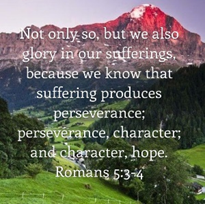
As well as trusting God, we have to develop qualities of steadfastness in our own character. Paul says: ‘We know that suffering produces perseverance; perseverance, character; and character, hope.’ (Romans 5:3-4).
How do we demonstrate the value of hope?
At Preston Candover CE Primary, we develop our value of hope through supporting children in a nurturing environment, empowering them to give their best and develop resilience. The adults and children in school are encouraged to try their best in all that they do. We encourage children to be hopeful, to think positively and we work hard to bring hope to the children whose lives are difficult at the moment. Provision of an inspiring curriculum, collective worship, church service participation, leadership roles and community involvement offer the children a sense of hope and purpose.
- We encourage pupils to work hard to achieve their goals
- We provide inspiration and aspiration
- We develop crucial skills of resilience and patience
- We teach the importance of perseverance
- We embrace mistakes, knowing we can learn from them
- We are compassionate and support eachother
- We establish a culture of trust and responsibility
- We use leadership roles to support pupil’s personal development
- We facilitate opportunities for children to complete acts of service
- We celebrate pupil achievement and encourage a sense of joy following success
- We prepare children for the next stage in their life
Justice
Justice in our school describes how we take responsibility for ourselves, one another and do what is right.
Justice is about being fair and making wise decisions even when it is difficult.

When thinking about ‘justice’, some people think first about giving wrongdoers the punishment they deserve. Justice is not about a culture which encourages everyone to insist on their own rights at the expense of others. It is about a community that knows that everyone’s well-being is bound up with that of everyone else.
Justice is also about acting out of a concern for what is right and seeing right prevail. It is about social justice, especially for those who suffer most and are least able to protect themselves. It means giving all people what is right and fair for them to have: life, health, freedom and dignity.
Scripture
Throughout the Bible, it is emphasised that justice is immensely important to God. It is fundamental to God’s character. ‘For the LORD is righteous, he loves justice; upright men will see his face.’ (Psalm 11:7)

In Exodus, the people are instructed to treat everyone fairly and to do what is right and just (Exodus 23:2). The bible emphasises that ‘The righteous care about justice for the poor (Proverbs 29:7). Isaiah says ‘Seek justice, encourage the oppressed’ (Isiash 1:17)
How do we demonstrate the value of justice?
At Preston Candover, we teach children the importance of fairness. We also teach them about injustice; racism and discrimination and how they have been overcome. We expect children and adults to be fair to one another.
We inspire children with stories of inspirational people like Martin Luther King and Gandhi who worked for justice. We encourage the children to try and make the world a fairer place for everybody through supporting things like Fairtrade and social justice.
http://www.christianvalues4schools.co.uk/
- We are fair
- We are inclusive
- We demonstrate forgiveness
- We show humility
- We treat everyone with equity
- We know that everyone has a voice
- We speak up for the truth
- We have the courage to speak out against injustice
- We stand against discrimination
- We are a democratic community
- We oppose discrimination and prejudice
- We courageously advocate
- We are reflective
- We provide opportunities for social action
- We follow rules and laws
- We encourage peace
- We promote democracy
- We learn how to stand up for what we believe
- We promote knowledge of injustice around the world
Key Parables and Teachings from the bible:
In our school, we have identified key parables and teachings from the bible that we use, linked to our vision and values. This is not an exhaustive list as others may be used.
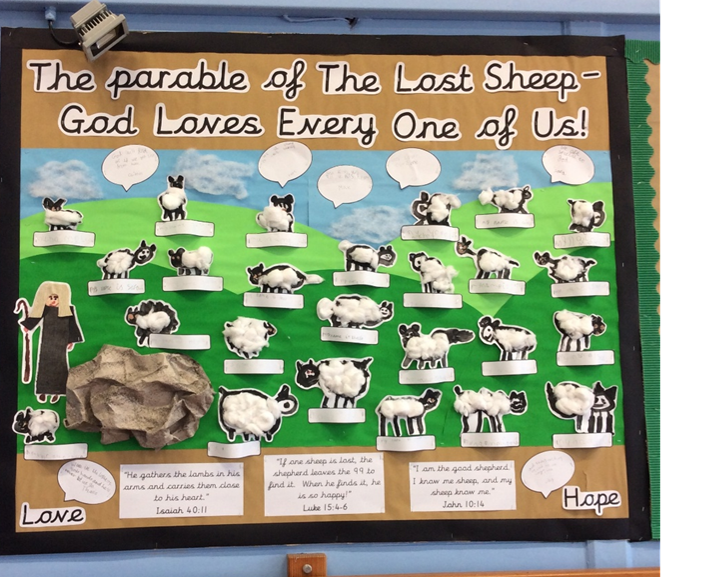
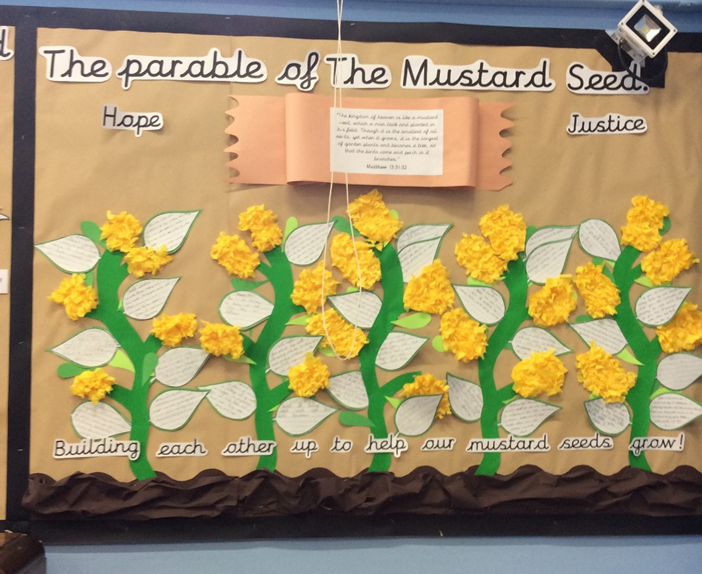
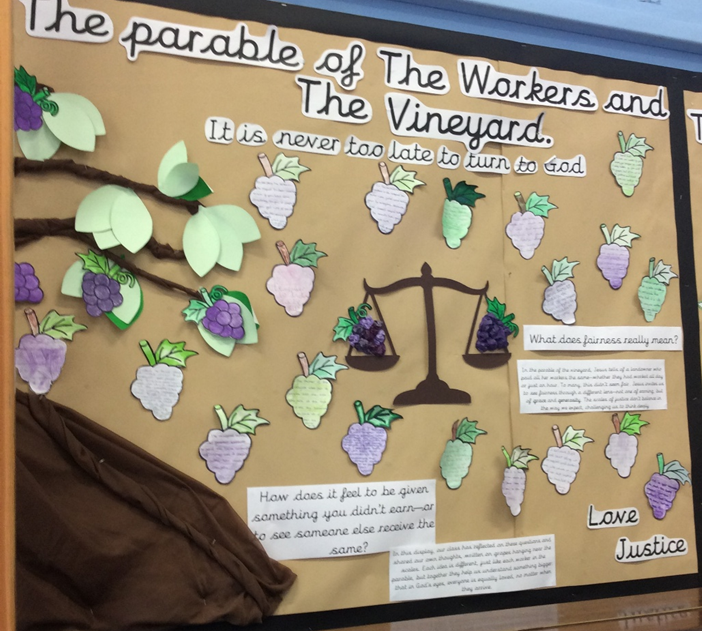
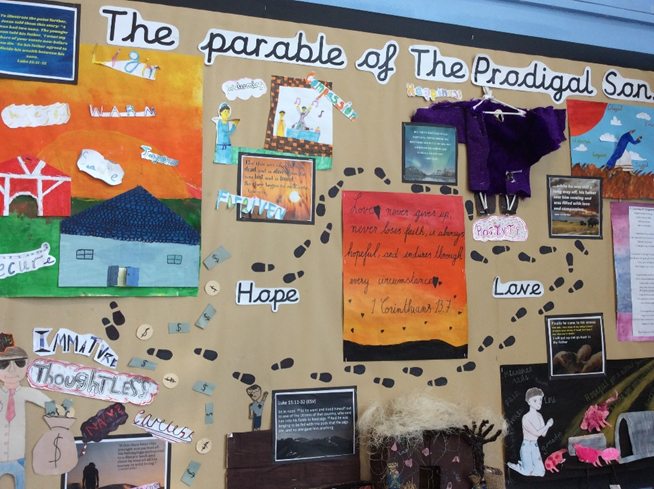
Key Parables
- The Good Samaritan (Luke 10:25-37) Links with Love, Justice
- The Prodigal Son (Luke 15:11-14) Links with Love, Hope
- The Workers in the Vineyard (Matthew 20:1-16) Links with Justice, Love
- The two sons (Matthew 21:28-32) Links with Justice, Love
- The Mustard Seed (Matthew 13:31-32) Links with Hope
- The sheep and the goats (Matthew 25:31-45) Links with Justice, Love
- The Lost Sheep (Luke 15:3-7) Links with Love, Hope
- The Good Shepherd (John 10:11-18) Links with Love, Justice
- The Rich Man and Lazarus (Luke 16:19-31) Links with Love, Justice
- The Unforgiving Servant (Matthew 21:28-32) Links with Love, Justice
- The Great Banquet (Luke 14:15 – 24) Links with Love, Justice
Other teachings from the bible
- The Sermon on the Mount- Matthew 5-7 Links with Love, Hope, Justice
- Jesus Heals a Leper (Matthew 8:14/ Mark 1:40-45, Luke 5:12-16) Links with Love, Hope, Justice
- The Feeding of the Five Thousand (John 6:1-14) Links with Love, Hope, Justice
- The Birth Narratives (Matthew and Luke) Links with Love, Hope, Justice
- Daniel in the Lion’s Den (Daniel 6:1-23) Links with Love, Hope, Justice
- Noah and the Flood (Genesis 6-9) Links with Love, Hope, Justice
- Joshua fought the Battle of Jericho (Joshua 6:1-27) Links with Love, Hope, Justice
- Rahab and the Two Spies (1 Samuel 17) Links with Love, Hope, Justice
